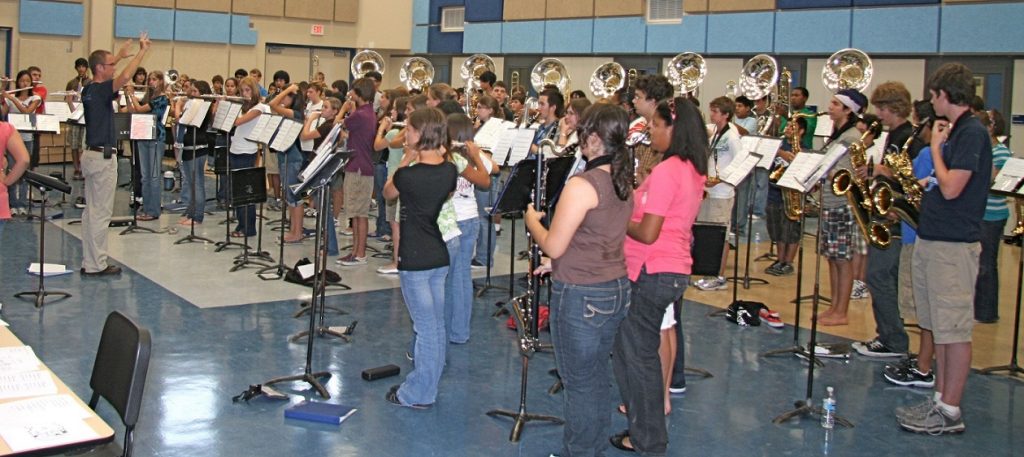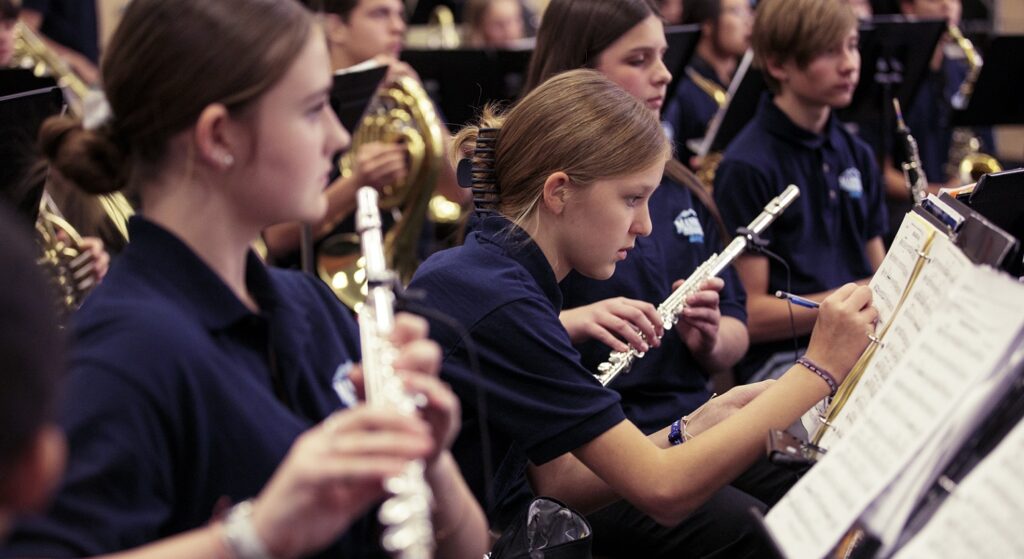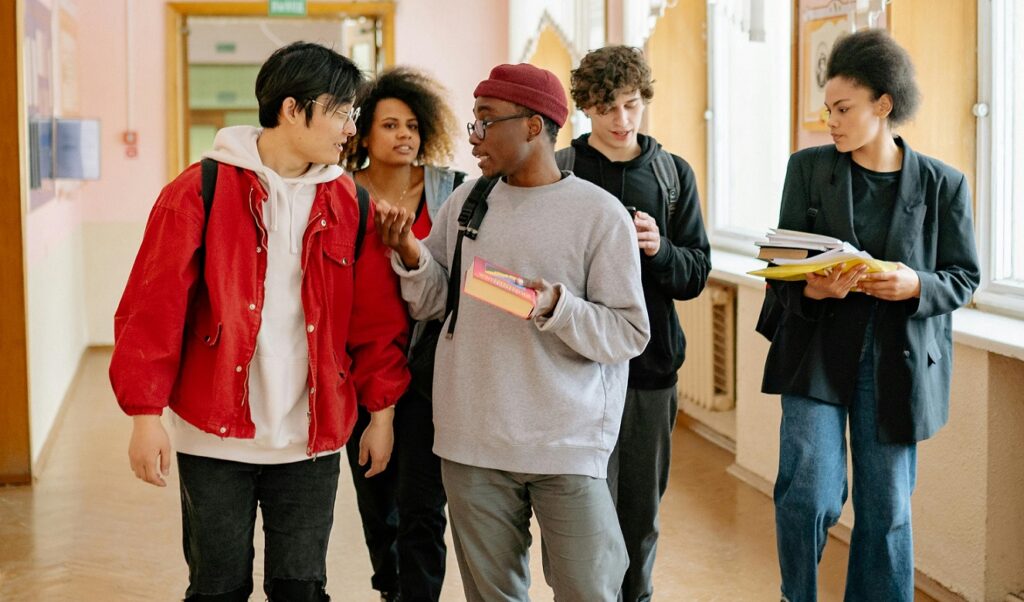Make Band a “Home” for Everyone
To make band a place for everyone, you must create an experience that offers multiple and flexible ways to participate.
How can you make band a place that everyone enjoys? From student musicians who want to be the very best in the all-state contest, to those who are more casual and never practice outside of class, to athletes who want to participate in band, to students who want to be in choir, orchestra, theater and band.
You must create a band experience that builds program numbers through multiple and flexible ways to participate.
A Look Back
It has been nearly 20 years since I graduated from high school. When I visit family in New Jersey, I am always excited to catch up with my closest friends from the South Brunswick High School band. Although the time since our last ride on a yellow school bus together increases with each visit, I am always amazed at how we pick up right where we left off, usually listening to Billy Joel or Buddy Rich and laughing until the wee hours of the morning.
We used to blast the Piano Man’s music on the rides to and from competitions and football games. I always identified with the lyrics from “Only the Good Die Young,” where Joel sings about the company he keeps. He says, “We ain’t too pretty, we ain’t too proud … we might be laughing a bit too loud … but that never hurt no one.”
I have never laughed harder in my life than on those bus rides with my best friends in band (although riding a drum corps bus through Arkansas in July with no A/C may come close!). These are the memories from high school I cherish the most.
As the band director at Claudia Taylor “Lady Bird” Johnson, a competitive Texas 6A high school program, I frequently reflect on the experience our students have every day. The namesake of our school once said, “How fortunate are we to have such a treasure of memories.” This quote resonates with me because I want our students to graduate from our program with the same “treasure of memories” that my friends and I share to this day.
Fortunately, my high school experience provided a familial environment that challenged me to reach new levels of musical excellence that I did not even realize was possible. My high school band director, Mark Kraft, and his wife, Ginny, the school’s choir director/visual designer, pushed us as musicians and set the highest standard for our level of musical achievement. Our marching band was very competitive during my four years of high school. In my sophomore year, our wind ensemble performed at the National Concert Band Festival. And, in my senior year, our jazz band was a state medalist. We had a well-rounded musical experience rooted in teamwork in an environment where kids of different backgrounds and motivation levels could be satisfied.
My goal is that the students at Johnson benefit from a similar approach, one that balances a pursuit of excellence while fostering a love for music and teammates.
Create a Culture that Values All Levels of Engagement
With many choices and mounting pressures on students, it’s easy to forget that kids “elect” to continue participating in the activities they enjoy most. By the time students have been a part of band for a few years, they may find that it has become increasingly difficult to balance the challenges of academics, band and pursuing another interest.
Always remember that kids do band for their reasons and not those of their parents or teachers. Band is a large part of my life, but it doesn’t have to be as prominent a part for all my students.
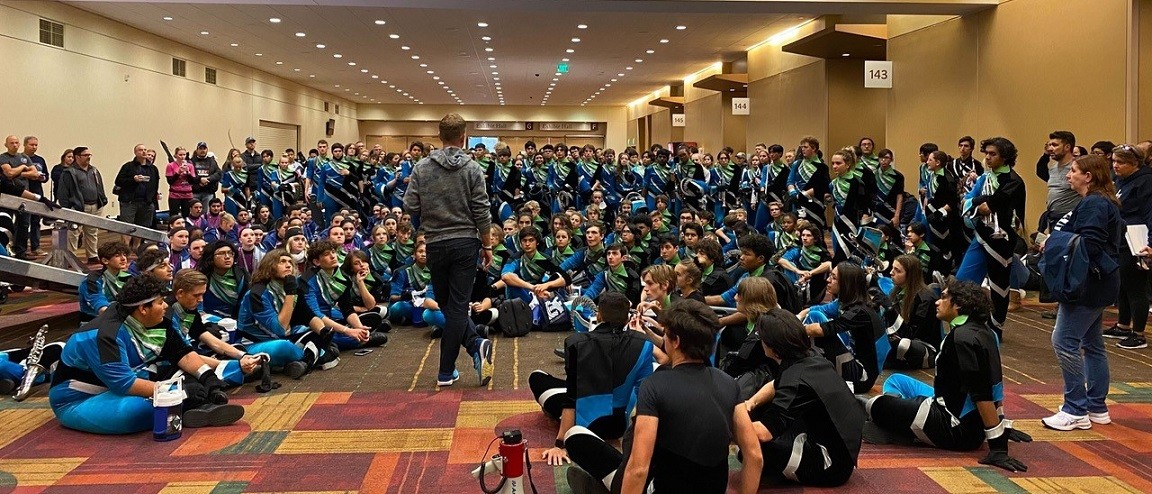 For students, band can be:
For students, band can be:
- A social experience
- A musical experience
- A competitive experience
- A learning experience
- A safe space
Understanding that kids do band for their reasons, encourages me to find common ground with them. It makes me work harder to create an environment where students who are more casual about their love for music can still find the same joy in our program as the kids who strive to be all-state musicians. I said earlier that many of my favorite memories from band are the bus rides — not the performances. Allowing students to see the value in participating in music at any level of commitment will increase a sense of belonging across the program.
Johnson’s program has more than 300 students, and about one-third of them are driven to be all-state musicians. Another one-third are very competitive about marching band, but not necessarily concert band. And the final one-third are there more for the bus rides and football games. As band directors, we must help our students understand and respect that there are many different reasons to be in band, and each one adds value to the team and plays a critical role in the success of our program.
We also work tirelessly to teach our students the importance of tolerance and sensitivity toward their peers. We want students of all racial, sexual and socioeconomic backgrounds to feel and be safe and valued. Our program has a zero-tolerance policy for hate, which means we must constantly teach students what hate looks and sounds like. This involves a few different steps in the process to help students learn appropriate behaviors:
- Directors model compassionate, appropriate and accepting behavior. We work to create an environment where all students feel safe and accepted. The behavior must come from the top. Be willing to apologize and admit when you make a mistake.
- Meet with student leaders before the season to define our culture as compassionate and caring. If it is not kind, helpful or necessary, it does not need to be said. If the leaders model appropriate behavior, they can also monitor it in their sections.
- Teach digital citizenship lessons. Define cyberbullying and show examples of hateful or discriminatory posts or comments online.
- Complete a hazing training session with all band members prior to the start of camp. This includes a discussion on what hazing is, what behaviors could be considered hazing, and the consequences of hazing. In our case, students who haze another student will be dismissed from band and could face further penalties on campus.
- Provide a system to anonymously report bullying. Students have a box on campus they can anonymously report suspected mistreatment of others for a follow-up investigation.
- Define consequences for hazing, bullying or discrimination and follow-through. Kids are perceptive, if they do not believe there will be follow through, they are less likely to report.
- Reinforce through weekly student leadership meetings or conversations with band members the importance of patience, tolerance and compassion as the season progresses so that the early season discussions are not just a “box to check.”
Our staff believes wholly that a team cannot function without mutual respect and care. We want every student to find that sense of belonging in our organization.
You Don’t Have to Choose
When Johnson High School opened in 2008, our first principal, Kris Wickerham, established a campus “edict” that coaches and directors needed to work together to allow students to participate in multiple activities. Simply put, our campus would not make kids “choose” between sports and fine arts or between different disciplines within fine arts. Nearly 15 years later, this policy now shapes the culture of our community, and while it is not perfect, I am amazed at the efforts made to allow kids to pursue what they love.
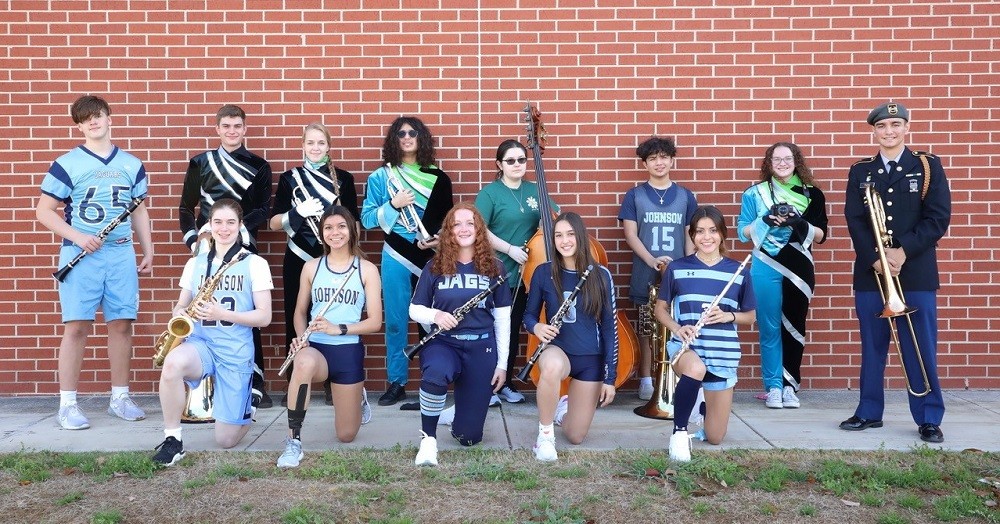 There are examples across the country of football players marching in the half-time show, band students singing in the musical or choir, and fine-arts students excelling in athletics. And at Johnson, we are proud to have students in all grades and band levels who participate in multiple other activities, and some do it for all four years.
There are examples across the country of football players marching in the half-time show, band students singing in the musical or choir, and fine-arts students excelling in athletics. And at Johnson, we are proud to have students in all grades and band levels who participate in multiple other activities, and some do it for all four years.
To achieve an environment where kids can participate in many activities takes planning, patience and often sacrifice on the part of the coaches, sponsors, directors and parents. Ideally, keeping kids out of the middle of conflict always helps their experience, but this is not always possible. Some suggestions to help students achieve success in multiple activities:
- Create a hybrid calendar that lists music and athletic events for the upcoming season side-by-side to address conflicts early
- Consider a policy that prioritizes competitions/games/performances over practice so that the student is there for the most valuable events
- Allow students the time to attend training and summer camps for both activities
- Communicate frequently with parents and sponsors of the other activity to see what is working and what is not
- Ensure students have adequate time for tutoring and allow them to miss rehearsal to catch up on homework during their busiest seasons
- Be willing to share and encourage this as a part of your culture
- Don’t give up; it won’t be perfect, but it will be worth it for the student
- Be willing to allow students to follow their heart, even if it guides them toward the other activity — and try not to take it personally.
Your students will learn from being a part of many disciplines, and they will bring those skills to band (as well as all their future endeavors). They will also share lessons learned from your program with other teams and groups. The culture of sharing can translate into a great relationship with athletics, spirit and the other fine-arts programs.
Directors must recognize that students may not be 100% for the band program all four years in high school as they work to juggle other activities. That’s what makes high school such a wonderful time of discovery for students. Allowing band members to be a part of a high-achieving band while still enjoying different activities and focusing on academics is a worthy goal. Life is messy. I am the first to admit that in a competitive program, band sometimes gets in the way. We keep working to find the balance every year, knowing we will make mistakes along the way and recalibrate to find the best possible experience for our students.
For example, early on we were very literal with our attendance policy as it related to competitions and performances. Sometimes students approached us with important birthday parties, graduations or other major life events, and we would almost always require that they be at a performance no matter what. Our reasoning was that everyone on the team was sacrificing for the performance. This came from a fear that we would see a lot of kids missing performance days. In truth, most conflicts are few and far between, and we felt a growing resentment from parents and students that band was taking over their lives. Kids were giving up significant events with families like weddings or possibly leaving other organizations because they felt like they could not balance everything. We have since modified this policy to encourage students to see the value in major milestone events, and we work to communicate about those as early as possible to find an understudy or create a dynamic where the student can possibly attend the performance and their family event. We want our organization to be the very best. We also want our students to enjoy every experience possible.
Coming Full Circle
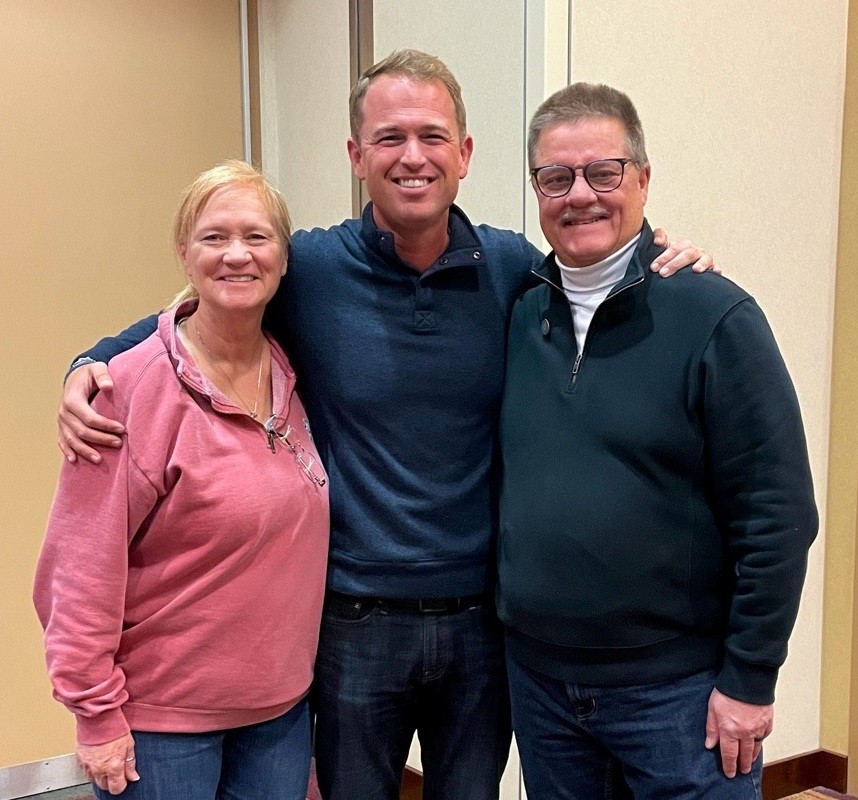 At Grand Nationals in Indianapolis this year, my high school band and choir directors, Mark and Ginny Kraft, spent three days with us, supporting our students and me. Believe it or not, I keep in touch with the Krafts two to three times a week, even 20 years after my high school graduation!
At Grand Nationals in Indianapolis this year, my high school band and choir directors, Mark and Ginny Kraft, spent three days with us, supporting our students and me. Believe it or not, I keep in touch with the Krafts two to three times a week, even 20 years after my high school graduation!
I value their advice and mentorship, and I would not be the teacher I am without them. I vividly remember Mark sharing a clear philosophy with our high school band that I have applied to my own program: “Do the right thing, because it’s the right thing to do.” This statement is simple but far more challenging to actually live out. The Krafts preached and modeled this behavior with students and were the first to self-reflect and admit when they made a mistake. I try to do the same in my interactions with my students.
Our band song, selected by Mark and Ginny, was Whitney Houston’s “Greatest Love of All,” and the opening lyrics influenced me as a student and now as a teacher — “I believe the children are our future, teach them well and let them lead the way, show them all the beauty they possess inside, give them a sense of pride to make it easier.” My experiences as a student in the South Brunswick band provided me a sense of belonging and afforded me confidence that carried me through my tumultuous teenage years
While in Indy, Ginny remarked, “It’s like being grandparents for the students in the program.” The Krafts have had a profound influence on my teaching but an even more significant impact on my desire to provide the students at Johnson High School with positive life-changing adventures.










